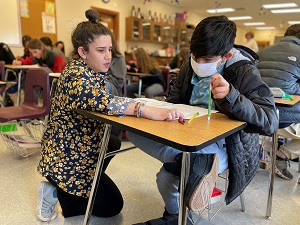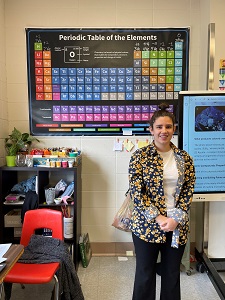Jules Picuri feels hopeful about her future in education as a fourth-year science teacher at Atherton High School. But the young educator who moved to Kentucky for the Teach Kentucky program had thoughts of pulling the plug on her new career before getting help from programs Jefferson County Public Schools (JCPS) has recently implemented to engage, support, and retain teachers.
Picuri was a first-year teacher in 2019-20 when she lost two students to gun violence. The trauma was overwhelming, she said, and the hits kept coming that spring when COVID-19 set in and disrupted classrooms nationwide.
Her second year teaching in 2020-21 wasn’t much better, she said. Nontraditional instruction (NTI) replaced in-person classes for most of the year, and Picuri tried to balance it all while finishing up her master’s degree.
“I was feeling very overwhelmed and insecure,” Picuri said. “I definitely had thoughts of ‘this isn’t for me, I don’t want to do this.’”
But Picuri stuck it out, thanks largely to a JCPS new teacher mentorship program that paired her with Andrea New, a seasoned chemistry teacher at Atherton.
Picuri met with New during professional learning community (PLC) meetings and after school. Her principal at the time, Dr. Tom Aberli, also rearranged schedules to allow the mentor and mentee to co-teach. The opportunity gave Picuri a chance to both observe New in action and get high-quality feedback on her own teaching style and lesson structure.
“She was so willing to help me and mentor me through that process,” Picuri said. “We were matched really well, and she was incredibly helpful.”
Data-Driven Teacher Retention
What makes a teacher tick varies from person to person. Good leaders recognize this and show appreciation in different ways to different people, said Dr. Marco Muñoz, JCPS Assistant Director of Employee Retention.
Muñoz has spent the last three and a half years laser-focused on keeping teachers engaged so they stay in the classroom. JCPS tackles retention in many ways–from compensation to culture and climate.
A boost in salary helps retention, Muñoz said. In 2022-23, all full-time JCPS staff received a 4 percent raise. The Jefferson County Board of Education (JCBE) and Jefferson County Teachers Association (JCTA) recently approved another 5 percent raise–the largest in two decades–that will take effect in July 2023 and bring the average teacher salary to $73,000.
In negotiating the latest raise, the JCBE and JCTA also approved additional changes to the teacher contract that will give staff more flexibility and help JCPS recruit and retain teachers. For example, the contract extension:
Allows sick days to be used in half-day increments instead of full days. That gives teachers more flexibility to, for instance, go to a doctor’s appointment but still work part of the day.
Allows lost planning time to be made up outside the normal workday, including at home.
Getting regular feedback during the school year and acting on that feedback to improve culture and climate is also critical to address teacher needs and keep them in the profession, Muñoz said. Teachers appreciate when school administrators notice the hard work they do every single day as well as when they actively seek teacher input when making important decisions, he said.
Two years ago, JCPS piloted a program with Upbeat, a teacher retention organization, at 18 Accelerated Improvement Schools (AIS). As part of the program, certified staff at each school completed a research-based teacher engagement survey in the fall with questions on topics linked to teacher retention such as school climate, hiring and onboarding, professional development, teacher voice/leadership, and teacher appreciation.
Administrators used the resulting data to identify strengths and weaknesses. Teacher engagement experts then conducted one-on-one coaching sessions with principals to address the highest priority areas for growth. Staff repeated the survey in the spring to measure progress and use the data to plan the following school year.
The pilot schools saw an impressive 12.5 percent gain in teachers retained from one year to the next, Muñoz said. As a result, the Upbeat program is now used in all JCPS schools.
Overall teacher retention in JCPS had been on the upswing, increasing steadily from 2018-19 to 2021-22. But the 2022-23 school year snapped that streak, with the district-wide teacher retention rate decreasing due largely to resignations, Muñoz said. The teacher retention rate is still high, sitting at 93.5 percent, but varies from school to school.
JCPS continues to provide other supports that schools can tap into to help teachers succeed:
Allowing new teachers to observe senior teachers who are experts in specific areas that need support (e.g., classroom management and engaging instructional practices).
Creating school-based new teacher cohorts that meet weekly outside of normal school hours to support staff and build camaraderie. Teachers are paid for that time, typically through school improvement grant funding.
Muñoz said he can also help connect administrators with schools that can share evidence-based best practices to improve teacher engagement and retention.
Teacher Appreciation
Muñoz is on a mission to make sure all JCPS teachers feel appreciated. But there’s not a one-size-fits-all approach, he said.
Some individuals need words of affirmation, while others might benefit more from shared quality time and receiving specific resources, he said. His office is working with administrators district-wide to understand The 5 Languages of Appreciation in the Workplace and push them to differentiate support for teachers the same way teachers are asked to differentiate support for students.
Muñoz reaches out via email to all new teachers during their first year to welcome and encourage them on their journey. He also keeps an ongoing birthday greeting program for all employees in JCPS so that “we can all celebrate our lives of service to others.”
Anthony Myrks-Brewer, a sixth-grade math teacher at Knight Middle School, said he found great value in Muñoz’s monthly emails that encouraged new teachers to be “persistent in your purpose.”
Myrks-Brewer, now in his fourth year of teaching, said he grew up in a home with domestic violence, drugs, and alcohol before being adopted in middle school. His childhood helped prepare him for some of the challenges he faced in his first two years of teaching and relate to students battling their own trauma, he said.
“You know, you have days where you’re like, ‘man, is this something I want to do for the rest of my life? Is this really the purpose for my life right now?’” Myrks-Brewer said. “What always grounds me is my mindset of being the teacher that I wish I would have had in middle school despite some of the day-to-day challenges.”
Alicia McBride, a fourth-year Exceptional Child Education (ECE) teacher at King Elementary School, said she also appreciated Muñoz and his words of encouragement.
“We all need that, you know, to feel we’re appreciated,” McBride said. “Just like we need to encourage the kids, educators need encouragement, too.”
McBride said she hopes more JCPS administrators will visit schools as often as they can to empathize with and support all teachers–new and veteran–who might be struggling.
“We need help dealing with the trauma, not just with the kids, but with our own trauma,” McBride said. “It’s important that we have a voice and know that our input has not fallen on deaf ears.”
Mental Health Supports
JCPS offers a range of supports to help teachers maintain a better work-life balance.
“There’s a wide spectrum of support that teachers need, from an occasional pat on the back to mental health support therapy,” Muñoz said. “We are trying to help young teachers discover what they need to have a good work-life balance and keep them in this life-changing career for the long term.”
One of those teachers who sought therapy is Picuri. Picuri said a strong mentor helped her immensely but a good therapist was also key. In fact, if she could give one piece of advice to new teachers, Picuri said she would tell them to pay close attention to their mental health and explore therapy if they think it might be beneficial.
Muñoz said JCPS continues to do everything possible to keep teachers appreciated, engaged, and in the classroom.
“I think the bottom line in all of this is we need to understand and have empathy about what it means to be a teacher in the first few years of their career,” Muñoz said. “What can be more important than taking care of the ones who take care of the kids in JCPS? Taking care of those new teachers is taking care of the future of JCPS.”
Schools can contact Muñoz for help tapping into teacher retention resources.
By Juliann Morris


